How to support your immunity after winter? What should you eat in the spring to be full of strength and energy, feel good, look young and healthy? Let's talk.
10 healthiest spring foods
1. Leafy green vegetables
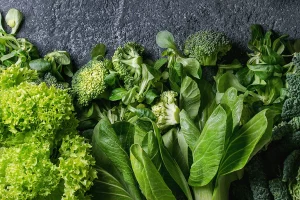
Spinach, arugula, salads and other leafy greens are low-calorie foods, rich in vitamins and minerals, and fiber.
Spinach helps with the functioning of the gastrointestinal tract, cleanses the intestines and liver. It improves blood supply to organs and tissues, and also contains folic acid, which is necessary in the diet of pregnant women. 50 grams of spinach contains half the daily value of vitamin A.
Arugula improves the functioning of the cardiovascular and nervous systems. It has a positive effect on the digestive system and is a natural antioxidant. Arugula is rich in beta-carotene, which has a positive effect on vision, vitamins A and B 9, K. It contains: iron, which is important for hematopoiesis, potassium (affects heart function), calcium (involved in metabolic processes), iodine (has influence on the functioning of the thyroid gland).
Leaf salads are useful because of the fiber they contain, which improves the functioning of the gastrointestinal tract. This green product prevents bloating and stimulates the production of protective intestinal mucus.
2. Microgreens
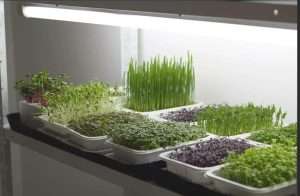
Young shoots are a storehouse of nutrients. Although it is small in size, it has a rich taste. According to research, microgreens contain up to 40 times more nutrients compared to mature produce.
The most popular types of microgreens are radishes and peas. Radishes are rich in vitamins C, K, group B and microelements (iron, potassium, calcium and magnesium).
Pea sprouts contain vitamins A and B, C and PP. This microgreen has anti-edematous properties, improves the functioning of the nervous and cardiovascular systems, regulates metabolism and improves the functioning of the reproductive system in men.
Now you can buy ready-made kits for growing microgreens. It grows on jute mats in containers or trays. The seeds germinate well and after 7 days you can harvest.
3. Young vegetables
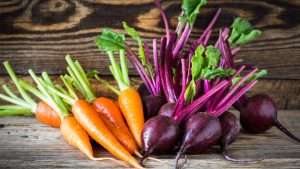
From young vegetables, such as radishes, carrots, beets, it is useful to make dietary salads rich in vitamins, especially ascorbic acid.
Radish improves the functioning of liver cells, strengthens the immune system and slows down the aging of the body.
Carrots reduce the risk of cancer and are useful for losing weight, reducing appetite.
If you want to have a beautiful tan, drink carrot juice. Carrots contain beta-carotene, which enhances the formation of melanin. Plus improves the skin's protective functions against sun rays.
Beets have antioxidant properties, improve bowel function and prevent constipation. Beet betaine improves liver function, stimulates the formation of bile and its outflow. This is especially important in the spring.
Young cabbage is included in the list of dietary dishes. It reduces swelling and improves the functioning of the gastrointestinal tract.
4. Green onions
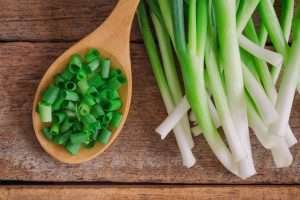
This vegetable contains so many vitamins and microelements that it is one of the best spring foods to support the immune system (in particular, due to the content of phytoncides and vitamin C, antioxidants).
Green onions improve the functioning of the cardiovascular and digestive systems. If an onion grows on your window, it spreads phytoncides and thereby protects you from viruses and bacteria.
5. Ramson
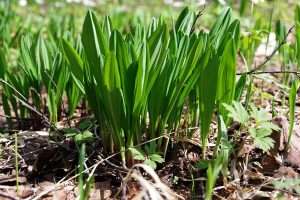
Ramson is useful because it normalizes blood pressure. The vitamins and substances this plant contains regulate calcium metabolism, improve skin quality and increase the body's resistance to infections.
Contraindications: you should not rely on wild garlic if you have gastritis and duodenal ulcers.
6. Asparagus
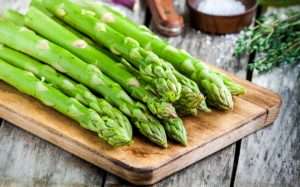
Asparagus is another one of the healthiest spring vegetables that has many valuable properties. This includes strengthening the immune system, improving liver and kidney function, and lowering blood cholesterol levels.
Asparagus also thins the blood. In addition, it has antioxidant properties (helps protect the body from free radicals). In addition, asparagus is an excellent diuretic (removes excess fluid from the body) and improves digestion.
Contraindications: exacerbation of gastrointestinal diseases, children under 3 years of age, not recommended for people with kidney disease and urolithiasis.
7. Broccoli
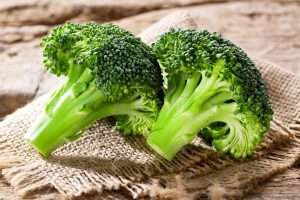
Indole-3-carbinol, ascorbigen and sulforaphane are substances found in cruciferous vegetables. They increase the activity of liver enzymes, which are responsible for detoxifying the body, and affect intestinal enzymes. Broccoli helps lower estrogen levels. Eating broccoli is a good prevention of malignant tumors.
Contraindications: people with pancreatic diseases, high stomach acidity.
8. Citrus

They can also be classified as spring products, not because they are seasonal, but because they perfectly replenish vitamin deficiencies after winter, strengthen the immune system and improve digestion.
Grapefruit, orange, lemon are rich in vitamins and contain pectins, which help cleanse the body. Citrus fruits stimulate the formation of the hormone cholecystokinin, which is involved in the excretion of bile. People prone to allergies and suffering from gastritis should not overuse citrus fruits.
9. Spices
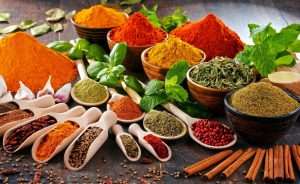
In spring, it is recommended to include spicy, warming spices (chili, fennel, dry ginger and black pepper) in every meal .
Chili has immunomodulatory, antibacterial and antiviral effects, improves the functioning of the gastrointestinal tract and blood circulation.
Fennel reduces gas formation and has laxative and sedative properties.
Dry ginger has a general strengthening effect, improves memory, and relieves migraine attacks.
Black pepper has a positive effect on the immune system, improves blood circulation and the activity of digestive enzymes. It contains piperine, which has an antimicrobial effect. Has anti-inflammatory and antioxidant effects.
Please note: people with gastrointestinal diseases should use spices with caution.
10. Fresh birch sap

This drink is relevant in spring and is very useful for strengthening the immune system. 1-2 glasses a day for a month will replenish the mineral composition.
Natural birch sap is a good replacement for mineral water from the store. You can buy this spring drink at any nearby forestry.

0 Comments